Equity, Diversity and Inclusion
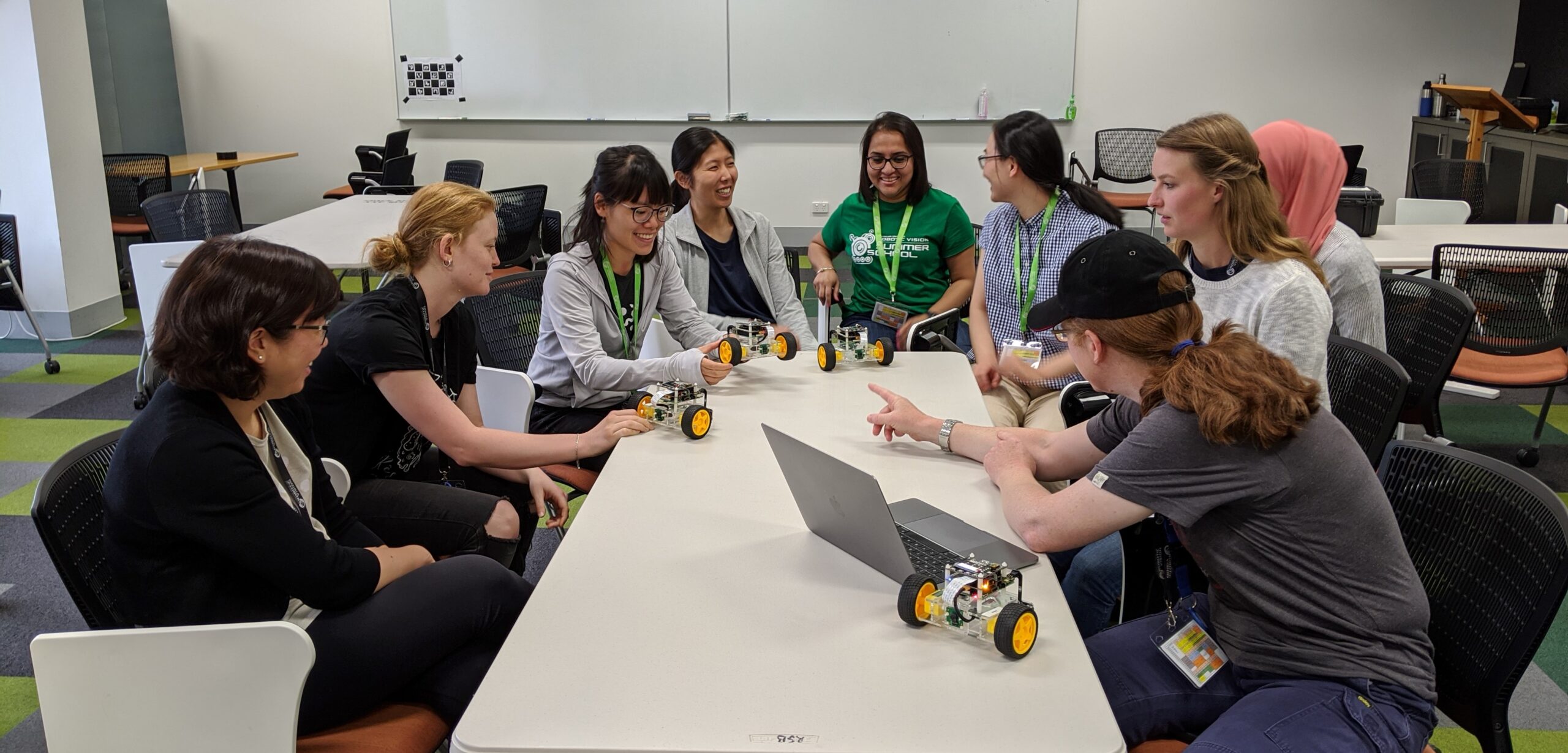
The Centre continued to implement its Robotic Vision Gender Equity Plan and offer knowledge leadership training to our researchers in equity, diversity and inclusion. It is hoped that Centre members will continue to push for positive change to correct gender imbalances in the fields of robotics and computer vision beyond the life of the Centre.
Gender Diversity
Over the past seven years, we have seen small but significant changes in shifting the gender imbalance within our Centre and increasing female participation.
When the Centre began in 2014, we had one female Research Fellow and one female PhD Researcher. We now have female representation across our Chief Investigators, Associate Investigators, Centre Advisory Board, Research Fellows, Research Engineers, and PhD Researchers.
We launched our Robotic Vision Gender Equity Plan in October 2017, at our annual RoboVis conference. The plan incorporated feedback from across the Centre and recommendations from Gender Matters, an Australian management consultancy the Centre partnered with to recommend how we could address gender and unconscious bias issues in the workplace. A copy of our Robotic Vision Gender Equity Plan can be downloaded here.
For the past three years, we have set gender performance targets including high stretch targets of 50% female representation for our RoboVis 2020 conference across delegates, speakers, and session chairs. In 2020 we achieved 27% female delegates, 50% female guest speakers, and 20% female session chairs, as outlined below.
Gender Diversity Performance Measures
Gender Diversity – Positions
*Professional Staff includes full-time & part-time operations staff
Gender, Diversity & Inclusion Training & Events
In 2020, the Centre became a member of Diversity Council Australia (DCA), an independent not-for-profit peak body focused on diversity and inclusion in the workplace. The DCA delivered our knowledge leadership program running 6 workshops covering the following topics: Unconscious Bias; Words at Work; Engaging Men on Gender Equality; and Cracking the Glass Cultural Ceiling. The training was insightful and provided our people with further understanding and practical ways we can all keep contributing to positive change in our workplace now and in the future.
There is still so much more that we all need to do, and it is encouraging to see the Australian Government is driving efforts to encourage gender equity in STEM education and careers. In 2019 it released two guiding frameworks: the Advancing Women in STEM strategy, and the Women in STEM Decadal Plan. From these frameworks, they established a 2020 Action Plan focusing on three key action areas and outcomes by 2030. These are:
- Enabling STEM potential through education: Australia’s education system, from early education to tertiary, will support the active inclusion of girls and women and enable them to explore their full STEM potential.
- Supporting women in STEM careers: Australian STEM workplaces support the active recruitment and retention of women in STEM roles at all levels.
- Making women in STEM visible: Girls and women see STEM education and careers as viable and interesting paths, and understand the opportunities offered by STEM for their futures
The Centre was truly fortunate to hear from three key female speakers during the year who shared their experience and expertise covering: creating inclusive workplace cultures; the critical importance and value of diverse teams; and their experience in their careers and advice for our early career researchers.
Lisa Annese, Chief Executive Officer (CEO) of Diversity Council Australia
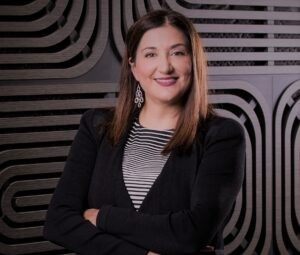 The Centre Executive invited Lisa Annese, CEO of DCA, to a roundtable discussion about how, as leaders, we can ensure we are creating and supporting equitable, diverse and inclusive environments. This was a wonderful and broad conversation. Lisa provided great insight into ways that we can build and support a more diverse and inclusive culture. She reminded us that inclusion is more than just a ‘feel good’ exercise – it creates a better work environment that fuels performance. The conversation also covered some of the actions we can take as leaders to ensure that we are creating an environment where gender diversity is valued and supported. In particular, learning to identify and respectfully call out those who make misplaced or uninformed comments in the workplace.
The Centre Executive invited Lisa Annese, CEO of DCA, to a roundtable discussion about how, as leaders, we can ensure we are creating and supporting equitable, diverse and inclusive environments. This was a wonderful and broad conversation. Lisa provided great insight into ways that we can build and support a more diverse and inclusive culture. She reminded us that inclusion is more than just a ‘feel good’ exercise – it creates a better work environment that fuels performance. The conversation also covered some of the actions we can take as leaders to ensure that we are creating an environment where gender diversity is valued and supported. In particular, learning to identify and respectfully call out those who make misplaced or uninformed comments in the workplace.
Dr Jackie Craig, SmartSat CRC
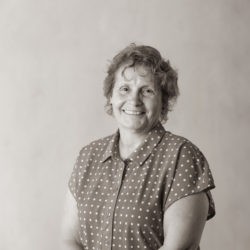
It’s all in the mind: Bringing our best collective mind to solve our biggest challenges
Dr Jackie Craig is an Adjunct Professor at Flinders University and a non-executive director of the Smart Satellite Cooperative Research Centre (SmartSat CRC). In 2020 Jackie was made a Member of the Order of Australia for her work in Defence Science. Jackie has extensive experience in lasers and optics, space-based and airborne Intelligence, Surveillance and Reconnaissance (ISR) systems, UAVs and cyber and electronic warfare systems.
Jackie was a keynote speaker at our RoboVis annual conference. She presented on why science and technology are needed now more than ever as the world faces multiple global unprecedented challenges, and that we need a collective “best mind” to work together. Jackie’s talk highlighted the importance of having diverse work teams where different perspectives and experiences are critical for success. She drew examples from a range of large projects and successful teams she had worked with, and the importance of good leadership as the backbone of any successful team.
Dr Catriona Wallace, CEO Ethical AI Advisory
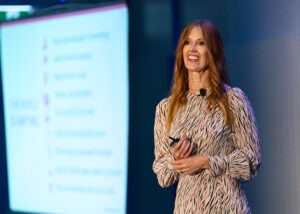
Human + Machine: The Rise of and need for Ethical AI
Dr Catriona Wallace is an entrepreneur in the Artificial Intelligence (AI) and Machine Learning fields and advisor on responsible technology, ethics and the future of work. She was a keynote speaker at our RoboVis annual conference, and her talk covered the problems of bias in algorithms, the need for ethical AI and leaders, as well as her inspiring but non-conventional career path. Catriona has a dedicated passion for encouraging more women to pursue careers in STEM. She founded artificial intelligence FinTech Flamingo AI, a company working at the cutting edge of AI technology to provide machine-learning based subject matter experts for enterprises in the United States and Australia. Flamingo AI was the second only female led (CEO & Chair) business to list on the Australian Stock Exchange. Catriona then went on to establish one of the world’s first consultancies, Ethical AI Advisory, purely focused on developing Ethical AI frameworks and capabilities for organisations concerned with the potential risks that AI may pose. She is an Adjunct Professor with a PhD in Organisational Behaviour, published author, analyst, and mother of five children.
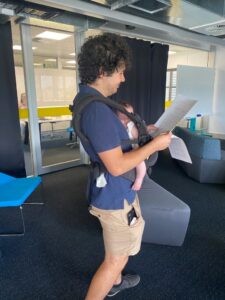
Research Engineer, Dr Steve Martin, multi-tasking in the Centre’s QUT Lab, reading a journal paper and caring for daughter Daisy. The Centre proudly encourages flexible work arrangements to accommodate individual’s needs and responsibilities and to assist participation in the workforce.